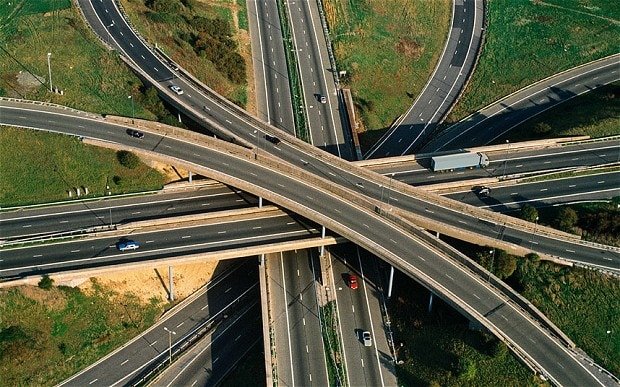
All people of all political denominations follow a sort of road-cult. Whenever the privatization of roads is proposed, they become shocked. Public roads have become a sort of idol for the modern man. Without public roads, there would be no civilization. Roads are the thin gray line that separates man from anarchy. Because of this, it is important to demonstrate how roads can be privatized without resulting in the collapse of civilization.
First, we need to realize that the way roads are currently run is a form of socialism: roads are publicly owned by the government. Roads are a nationalized industry. If it is true that without the state there could be no roads, it should also be true that without the state, there can only be starvation. If the roads are too complicated to be handled by private individuals, then how could anyone even dream of producing a pizza on the market?
To make a pizza one needs to cure meat, ferment milk, grind and spice tomatoes, produce a dough. All of these steps have infinite other steps. To cure meat one needs to herd livestock, which needs to be fed and maintained. Then the livestock also need to be butchered and processed, which requires the technology to butcher and process livestock. Then that technology needs metal, which must be mined. And the mining of metal needs tools in order to mine metal. Those tools need electricity to function efficiently. The complication of producing a pizza is infinite, far too complex for anyone outside the state.
Thus logically the nationalization of roads should also imply the nationalization of all pizzerias so as to prevent a tremendous scarcity of pizza. But even though the market is logically unable to produce pizza, the market can still produce bread. However, there is no alternative to roads. These complicated marvels of engineering are irreplaceable and irreplicable. There is no way a market system can ever produce something so complicated. Road must be the exclusive domain of the central planner.
And even though the central planners are brilliant, even they often fail at maintaining roads, as evidenced by the constant lack of road maintenance. If even the government can’t do anything about potholes, then it is impossible that a private individual could. If the government cannot keep and maintain roads, then how can it be expected that any company ever would. Furthermore, if roads were privatized we would all have to go through twenty toll booths to cross the street.
But we cannot concede this point. The fact that the government fails at maintaining roads does not necessarily imply that roads cannot be maintained. We have to consider the other perspective. It could be that the government simply has no incentive to maintain the roads. This crucial thin grey line is neglected by the government. The system of roads is not properly maintained and the state has abandoned the roads. If the roads are such a vital part of the economy, it could be that we need to privatize them to keep them from the abuse they receive at the hands of bureaucrats.
And it also just may well be that the argument about toll booths is disingenuous. It could be that having thousands of toll booths everywhere may result in at least a minor loss of revenue. Maybe there are better ways to charge money for the use of roads. The strategies of subscription services, digital tracking, and automatic tolls come to mind.
Furthermore, it might also be true that roads are not the most complex marvel of engineering. It could be true that people without the boundless wisdom of the central planner can actually maintain and build the roads. To build the roads one really does not need much more other than land no one else is using or land that is for sale. After the land
is acquired, it is easy to build roads.
And even if roads could not be privately built (though they have been and are), it is very possible to privately maintain these roads. There is no harm in privatizing the roads that are already built in exchange for reducing taxation. When roads are held privately, they will be better maintained so as to attract more drivers and by extension more revenue.
It also might be that the central planner does not have any special wisdom. It could be that the central planner simply manages roads in an arbitrary manner. The central planner is not by necessity intelligent. To the contrary, the central planner is hired by the government bureaucracy. The government bureaucracy is not renowned for its great breadth of innovation and intellectual pursuit. It may just be that road socialism is not necessarily superior to road capitalism.
And if roads can be built privately, it should also hold that pizzas could be baked privately, maybe private people can indeed make pizzas for public consumption. If this is true, it should also be reflected in reality. And upon a thorough analysis of the ownership structure of pizzerias, we determine that indeed pizzas are baked by private entrepreneurs. It could just be that socialism is not the answer, even when it comes to roads.
My question would be: How should a privatization process be carried out? What happens if the owner of the portion of the road that is in the middle of point A and point B, decides not to keep that space as a path.